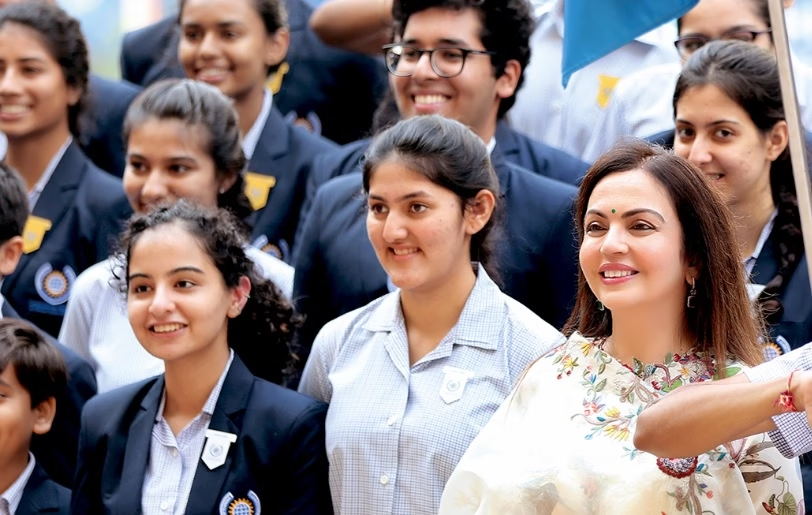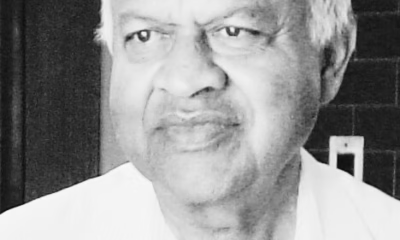EDUNEWS & VIEWS
Will Canada remain a hub for Indian students amidst new restrictions?
New restrictions on student visas and work permits have sparked debate about the future of Canada as a preferred educational hub

As Canada continues to position itself as a leading destination for international students, recent policy changes are raising concerns about its appeal, particularly among Indian students. New restrictions on student visas and work permits have sparked debate about the future of Canada as a preferred educational hub.
In the past decade, Canada has seen a surge in international students, with Indian nationals being a significant contributor to this growth. According to recent statistics, Indian students constitute one of the largest groups of international students in Canada. India sent 225,000 students to Canada, a number that rose to 278,000 in 2023. For the first half of 2024, the count has reached 100,000 students. However, new regulations imposed by Canadian authorities aim to address issues of overstaying and unauthorized work, potentially impacting this vibrant demographic.
Policy Changes and Immediate Implications
The Canadian government’s recent policy changes include stricter requirements for student visas and modifications to work permit conditions. Under the new regulations, international students will face more rigorous checks before their applications are approved. Additionally, there are enhanced restrictions on the type and amount of work international students can undertake while studying.
The new rules mandate that students must now provide more detailed evidence of financial stability and academic intentions. Moreover, there will be an increase in the frequency of status reviews and a more stringent enforcement of existing work permit regulations. These measures are designed to curb the misuse of student visas and ensure that students adhere to their intended study programs.
For many Indian students, these changes represent a significant shift in their academic and professional plans. “The new restrictions have created a wave of uncertainty among students planning to study in Canada,” says Arjun Patel, a recent high school graduate who was preparing to enroll in a Canadian university. “We’re concerned about how these policies will affect our ability to work part-time and support ourselves while studying.”
Impact on Current and Prospective Students
For current international students in Canada, the immediate impact of these policy changes includes increased stress over visa renewals and job security. Many students who rely on part-time work to support their education and living expenses might find themselves restricted by the new regulations. This could lead to financial strain and affect their academic performance.
Jose Jacob, a Canadian immigrant, attributes the recent restrictions on international students in Canada to a combination of political and economic factors. “Education is a billion-dollar industry for Canada,” Jacob notes. “When I arrived here, and for many years since, community colleges have been major promoters of study abroad programs. Many of these institutions are private community colleges operating like businesses. More foreign students mean higher fees, which significantly boosts the industry.”

Jacob also points out that the Trudeau government has traditionally been supportive of immigration. Under Prime Minister Justin Trudeau, Canada has welcomed international students, offered residency, and invited refugees. “Trudeau’s policies are driven by the immigrant vote bank,” Jacob explains.
Prospective students face the challenge of navigating a more complex visa application process. The enhanced scrutiny may lead to longer processing times and additional paperwork, potentially causing delays in starting their studies. “The increased documentation requirements and the possibility of visa rejections have made the application process more daunting,” notes Rina Sharma, a prospective student from Delhi. “We’re concerned about how these changes will affect our plans and whether it will be worth the investment.”
Canada’s Commitment to International Education
Despite the new restrictions, Canadian officials have reiterated their commitment to international education. They emphasize that the changes are intended to preserve the integrity of the student visa system and ensure that students are genuinely pursuing their educational goals. The recent decision to impose restrictions on foreign students came amid significant domestic protests. “The decision was announced during a period of considerable political pressure,” Jose Jacob adds. He also highlights that the rising cost of living and housing shortages in places such as Ontario have contributed to the government’s decision. “The surge in housing prices and the increase in the cost of goods led to saturation,” he says.
| Canada: Key changes |
|---|
| Increased Cost-of-Living Fund Requirement: International students must now demonstrate a minimum of CAD 20,635 in addition to their first-year tuition and travel costs to qualify for a Canadian study permit. |
| Off-Campus Working Hours: The temporary policy allowing international students to work more than 20 hours per week while classes were in session ended on April 30. The new limit is set at 24 hours per week, which is an increase from the pre-pandemic limit but lower than the anticipated 30 hours. |
| Cap on International Student Admissions: Canada has introduced a cap on international student admissions. For 2024, the number of approved study permits is expected to decrease by 35% to 360,000. Each province and territory will receive a portion of this cap and must issue an attestation letter for each study permit application starting January 22, 2024. |
| Restriction on Post-Graduate Work Permits (PGWP): Effective September 1, 2024, international students completing programs under curriculum licensing agreements will not be eligible for post-graduation work permits. This change targets programs that have less oversight and previously exploited loopholes. |
| Restricted Open Work Permits for Spouses: As of January 2024, open work permits are only available to the spouses of international students enrolled in master’s and doctoral programs. Spouses of students in undergraduate and other programs are no longer eligible. |
| Temporary Foreign Worker Program Changes: Canada has implemented restrictive changes to its temporary foreign worker program, potentially affecting job opportunities for international students |
“Canada remains dedicated to attracting top talent from around the world,” says, a spokesperson of a global education consulting group. “These policy adjustments are necessary to prevent abuse of the system and to ensure that our programs continue to benefit students who are committed to their studies.”
Moreover, educational institutions in Canada are working to support international students through these transitions. Many universities are enhancing their advisory services to help students navigate the new regulations and adjust their plans accordingly.
The Future of Canada as an Educational Destination
As Canada navigates these new policy changes, it faces the challenge of maintaining its status as a leading destination for international students. While the regulations are designed to address specific issues, they must balance the need for oversight with the desire to remain an attractive option for students worldwide.
For Indian students, the changing landscape presents both challenges and opportunities. While the new restrictions may complicate the immediate future, Canada’s robust educational infrastructure and diverse academic offerings continue to make it a compelling choice for many. The key will be how well the country can adapt to these changes while continuing to offer a supportive and enriching environment for international learners.

Jacob suggests that these new regulations are also aimed at curbing fraudulent courses. “Previously, the U.S. was marketed to Europeans as the ‘Land of Opportunities,’ attracting early settlers. Similarly, Canada has been marketed as a land of opportunity for Indian students. Community colleges have collaborated with local educational consulting agencies to promote this image. However, the situation has become too saturated. Technical jobs are in higher demand now, and Canada remains a good option for students in those fields.”
Jacob also warns prospective students about the financial realities of living in Canada. “For those coming here to make money, it’s important to understand that it’s not like the Gulf countries. Taxes are very high—13 percent on everything,” he advises. “It’s crucial to be aware of these factors before making the move.”
To sum up, as Canada adjusts its policies regarding international students, it will be crucial for both the government and educational institutions to address the concerns of students and ensure that the country remains a welcoming and viable destination for those seeking higher education. The coming months will reveal whether Canada can sustain its reputation as a global education hub amidst these evolving regulations.
EDUNEWS & VIEWS
Teacher Strength in India Crosses One Crore for the First Time
India’s teacher count crosses one crore in 2024-25, improving pupil-teacher ratios and female participation amid changing student enrolment trends.

For the first time in India’s academic history, the total number of school teachers in the country has crossed the one crore mark in the academic year 2024-25. This milestone was highlighted in the Unified District Information System for Education Plus (UDISE+) report released by the Ministry of Education on school education.
According to the report, this represents a 6.7 percent increase in the teacher workforce compared to 2022-23. The data further reflects the scale of India’s education system, which now comprises nearly 15 lakh schools catering to over 24 crore students across the country.
The enrolment pattern shows that nearly 50 percent of students are studying in government schools, followed by 41 percent in private institutions, with the rest enrolled in government-aided schools. Encouragingly, female representation among teachers has risen to 54.3 percent, while girls’ enrolment has reached 48.3 percent.
Better student-teacher ratios and declining dropouts
One of the most significant improvements reported is in the Pupil-Teacher Ratio (PTR). At the foundational, preparatory, middle, and secondary levels, the ratios now stand at 10, 13, 17, and 21 respectively, showing marked progress in easing classroom loads for teachers.
The Ministry also reported steady gains in dropout rates, student retention, and Gross Enrolment Ratios, indicating that schools are doing more to support students and keep them in the education system. Special attention has also been given to phasing out zero-enrolment and single-teacher schools, with better infrastructure additions enhancing the overall schooling environment.
Highlighting the broader significance of these trends, the Education Ministry stated that the growing teacher workforce is a critical step in ensuring equitable access and quality in education. Increased teacher availability is expected to improve classroom engagement, reduce regional disparities, and help address learning gaps. Schools, the report noted, are now becoming “more supportive and responsive to students’ needs,” which has also contributed to a reduction in early dropouts and greater inclusivity.
With the teacher count crossing the one-crore landmark and school indicators showing a positive trajectory, the government emphasized that the coming years will focus on consolidating these gains and ensuring that every child in India has the opportunity to access quality education.
Currently, India’s school system serves around 24.7 crore students across approximately 14.7 lakh schools, aligning closely with official numbers but reflecting a slight decline in enrolment compared to previous years. The overall student enrolment in 2024-25 marks a seven-year low, falling by about 11 lakh students compared to 2023-24. This drop is notably pronounced at the primary level (classes 1 to 5), which alone saw a decline of roughly 34 lakh students from the previous academic year. Key states like Uttar Pradesh, Bihar, Rajasthan, West Bengal, and Maharashtra reported some of the steepest enrolment declines, contributing to this national trend.
Government schools now account for about 50 percent of enrolment, though some states have witnessed a significant shift of students from government to private schools. This shift has raised concerns about the government’s capacity to retain students in public schools, with efforts underway to address infrastructural and quality gaps.
On the positive side, there has been progress in girls’ education with girls’ enrolment hovering near 48 percent nationally. The Net Enrolment Ratio (NER) for girls at primary education stands at approximately 90 percent, indicating a high level of age-appropriate enrolment. The secondary and higher secondary levels have shown improvement as well, aligning with the National Education Policy’s target of universal enrolment by 2030.
EDUNEWS & VIEWS
India’s Dhirubhai Ambani School Ranked Among Top Global Highschools
Founded in 2003, India’s Dhirubhai Ambani International School is also one of the youngest schools to feature in the rankings.

India’s Dhirubhai Ambani International School in Mumbai continues to shine on the global education stage, ranking fifth among schools outside the US and UK in the 2025 HSBC Hurun Education Global Highschools list. Founded in 2003, it is also one of the youngest schools to feature in the rankings.
The report emphasizes schools’ performance based on alumni university destinations, co-curricular development, and institutional reputation. With 190,000 students across the 180 ranked schools, only 0.6% of those listed are from India, underscoring the school’s elite standing.
In a media statement, Rupert Hoogewerf stated, “The list recognizes schools adding the most value to students’ futures. India’s presence through DAIS highlights the global competitiveness of select institutions in the country.”
Dhirubhai Ambani School joins a select group that includes Seoul International School, Chinese International School (HK), and Kolej Tuanku Ja’afar (Malaysia) in representing Asia outside China.
EDUNEWS & VIEWS
Global Highschool Rankings 2025: UK and US Dominate, China Rises
Among the standout institutions, Westminster School maintained its dominance with over 40% of graduates entering Oxbridge

In a global assessment of elite high schools, the HSBC Hurun Education Global High Schools 2025 report has named Westminster School in London as the world’s best high school for the third consecutive year. The annual ranking, now in its third edition, evaluates the top 180 independent schools across 11 countries based on university placements, co-curricular development, and institutional reputation.
The list reflects a shifting but still concentrated landscape of educational excellence. The United States and the United Kingdom together accounted for 85% of the world’s top highschools, with the US leading at 45% and the UK at 40%. However, China emerged as a strong contender, ranking third with 16 schools—up from 13 last year.
“The number of Chinese students studying abroad fell last year, but there are still nearly one million,” said Rupert Hoogewerf, Chairman and Chief Researcher of Hurun Education. “Interestingly, with 16 top-ranked highschools, Chinese families are finding viable options closer to home—avoiding time zone issues and maintaining cultural continuity.”
Among the standout institutions, Westminster School maintained its dominance with over 40% of graduates entering Oxbridge. St Paul’s School rose to second place, while The Dalton School in New York dropped to third. Notably, Winchester College returned to the top 10 and was named the world’s best boarding school, surpassing even Eton College and Phillips Andover.
“These rankings offer forward-looking insights for families planning their children’s international education,” said Kai Zhang, Head of International Wealth and Premier Banking, HSBC Asia, in a media statement. “Destinations like Hong Kong and Singapore are becoming increasingly attractive for their proximity and cultural alignment with Asian families.”
The report also revealed evolving trends in school environments and demographics:
>> 70% of the schools are co-educational, with a growing shift among historically boys-only UK schools admitting girls.
>> 51% offer boarding options, while half remain day schools.
>> The average school size was 1,050 students, with 140 graduating each year.
>> The average age of these schools is 204 years, with some—like King’s School, Canterbury—tracing roots back over a millennium.
Meanwhile, India’s Dhirubhai Ambani International School in Mumbai ranked 5th among schools outside the US and UK, continuing its position as a global outlier in quality private education from the subcontinent.
Despite steep tuition fees—averaging $63,000 annually for boarding schools—demand for places remains high. However, the UK’s recent addition of VAT on private school fees has prompted concerns, with schools like Winchester now costing over $80,000 per year.
Another key theme this year is the integration of creative thinking and AI literacy in education. “There is a real push toward STEAM, adding ‘Arts’ to STEM. Schools are under pressure to future-proof education and prepare students to thrive in the 2050s,” Hoogewerf added.
With data drawn from university destinations, co-curricular achievements, and alumni impact, the HSBC Hurun rankings offer more than a leaderboard—they reflect the evolving priorities and challenges in elite education worldwide.
-

 Space & Physics5 months ago
Space & Physics5 months agoIs Time Travel Possible? Exploring the Science Behind the Concept
-

 Earth6 months ago
Earth6 months ago122 Forests, 3.2 Million Trees: How One Man Built the World’s Largest Miyawaki Forest
-

 Space & Physics6 months ago
Space & Physics6 months agoDid JWST detect “signs of life” in an alien planet?
-

 Know The Scientist5 months ago
Know The Scientist5 months agoNarlikar – the rare Indian scientist who penned short stories
-

 Society4 months ago
Society4 months agoShukla is now India’s first astronaut in decades to visit outer space
-

 Society4 months ago
Society4 months agoAxiom-4 will see an Indian astronaut depart for outer space after 41 years
-

 Earth4 months ago
Earth4 months agoWorld Environment Day 2025: “Beating plastic pollution”
-

 Society6 months ago
Society6 months agoRabies, Bites, and Policy Gaps: One Woman’s Humane Fight for Kerala’s Stray Dogs












